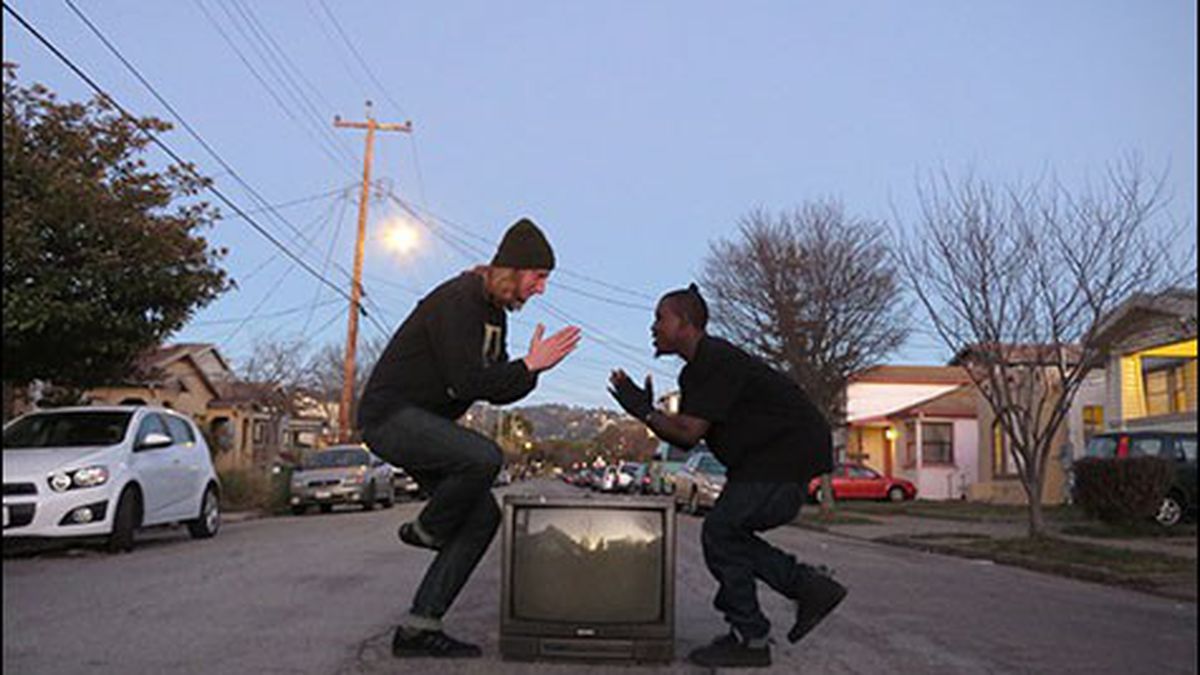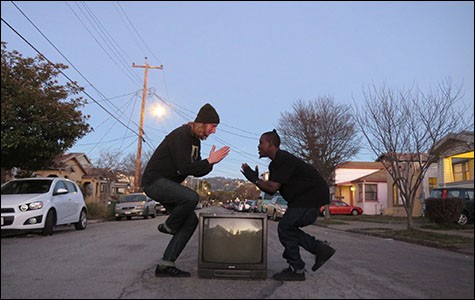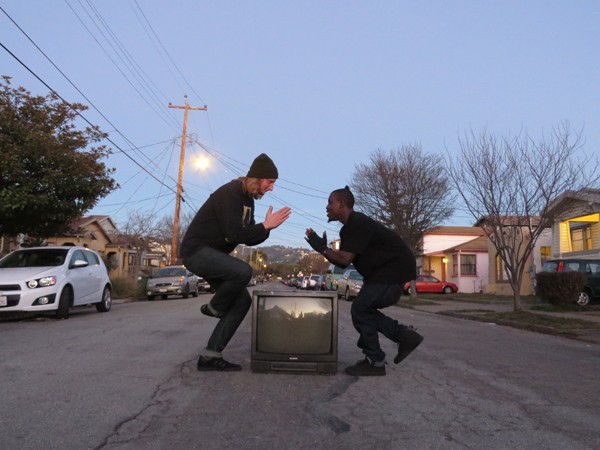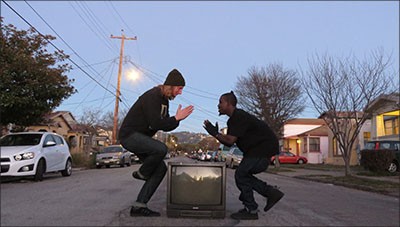The third track on Thriftworks’ latest album, Deviation, is called “Feeding Time.” It opens with the sound of a beast scarfing down a meal. After a series of laser gun-like noises, a thudding bass line like heavy footsteps is followed by the sound of whistling. Thick, buzzing synths fill the air, then the beast says, laughing, “Huh, huh, Terry! It’s feeding time.” The track reverberates and hisses, anchored by sinister, organ-like chords. The effect is haunting and unforgettable, and it’s just a sample of the very strange, highly entertaining, and sonically creative force that is Thriftworks, aka rising electronic music producer Jake Atlas. The Berkeley-based musician makes sample-based electronic music that’s weird and heavy, but also relatively mellow compared to his contemporaries: Rather than bang, his tracks creep, slither, and, ultimately, groove.
Atlas started making beats when he was sixteen and living in his hometown of Mechanicsburg, Pennsylvania. After attending the University of Delaware for one year, he moved to the East Bay in the fall of 2008 to attend Ex’pression College for Digital Arts — or, at least, that’s what he told his parents.
“I lied and said I wanted to be a recording engineer, which was something more viable than saying I was going out here to continue making beats,” said Atlas.
After graduating and recording a few “indie hipster bands,” as he described them, he devoted himself to creating his own music. Today, he lives in Berkeley with two roommates, whom he also collaborates with: Jacob Van Leeuwen, aka Jake Lion, who creates all of Atlas’ artwork, which features distorted skulls and dinosaur-inspired imagery; and Diamond Harris, aka Mythicalifornian, a musician and rapper who has worked with Atlas since 2009. Some of Atlas’ most interesting tracks feature Harris, whose voice is usually distorted and deepened beyond recognition.
“I’m a computer musician, which is a weird thing to say, but I have musical roots,” said Atlas. He said he creates songs by either starting out with something he’s written on the keyboard or by gleaning inspiration from music he’s found online or in his vinyl collection. (He gestured to a crate of records, which he proudly said he obtained for free outside of Amoeba Records.)
Recently, he was inspired by a song on an old Judy Collins record that he found at his parents’ house over the holidays. He chopped it up and heavily pitched down a portion of it: The result is ethereal and pretty. Atlas said he’s inspired by a lot of different sounds: “ethnic stuff, vocal chants, Japanese koto music, soulful and strange female vocals.” There’s not much that’s off limits.
Atlas is sometimes labeled as a dubstep or glitch artist, and while he plays around with elements of those genres, his music is more expressive and creative than that of his contemporaries. Both dubstep and glitch tend to suffer from being too repetitive; although Thriftworks’ tracks are recognizable, no two sound the same.
Perhaps that’s why Atlas has been able to support himself for the last two years by making music. He releases all of his music via his Bandcamp page for free, although he recently switched to a donation-based model, which he said he said has generated a “nice supplementary income.” “It lets me eat more bagels in the morning before I start making beats,” he said, with a grin.
But Atlas is being humble. Last year, he performed at massive electronic music festivals like Symbiosis Gathering and Electric Forest and toured with Bassnectar. Most recently, he wrapped up a tour with trap artist Mimosa.
In person, he’s modest and downplays his abilities as a DJ. When he performs, he rarely plays his tracks all the way through, choosing instead to sample various snippets from his vast catalog of material. Since the fall of 2010, he’s released seven full length-albums online, as well as mixes and singles.
“I should concentrate more on keeping my mixes clean, but that’s not my forte. I’m not a DJ,” he said, referring to the fact that his live transitions between samples aren’t always smooth.
Instead, Atlas focuses on “being crafty, making noises that give me the chills, that are heavy, that bring out emotions I didn’t even know I had,” he said. Performing gives him the opportunity to showcase his massive catalog.
At Sea of Dreams, the massive New Year’s Eve party organized by Another Planet Entertainment at the Bill Graham Civic Auditorium this year, Atlas’ hour-long set was captivating. The room wasn’t very full when he began, but by the end of his set, it was packed, the air was thick with heady energy. Long-haired, tank-top-clad bros dipped and swayed, lost in a trance, as the deep bass warbled and glitchy beats gurgled.
Atlas has passionately devoted fans, to put it mildly. His Facebook page, where he describes himself as a “Seeker of Unearthed Sound,” has attracted more than 17,100 likes. But what’s much more striking is how intensely young people identify with and actively engage with his music. Atlas has created a cult of personality of sorts by putting his wit and offbeat sense of humor on display. Although he’s never publicly explained how “milk” came to be shorthand for “cool,” his fans have fully embracing the term. An album he released last February is called Terry-D, in honor of his spirit animal/alter-ego, the pterodactyl — because, he said with more than a hint of “duh” in his voice, he’s “a big fugly bird man.”
“I think everything about Thriftworks is different,” one of his fans, Tucker Rowe, wrote to me in an email. “That is what pulls people toward his music. It’s weird, but not weird in an unfamiliar sense. It’s the type of weird that makes you want to join in on the weirdness.”
Harris believes Thriftworks’ music resonates with his fans because it’s a reflection of his authentic self. “If the music is real and has soul, if it reflects a real person who is actually feeling that vibe, if it’s not regurgitated shit, then that’s when it takes a hold of people,” he said. “That’s all that matters: Giving people the same feeling you get when you’re making it.”
While Atlas’ music may be too far out for most fans of electronic music, that weirdness — unfortunately, an all-too-rare quality in the genre — is also what makes him great. And despite his protests to the contrary, he knows exactly how to manipulate an audience on the dance floor.
Editor’s note: A previous version of this story misspelled Jacob Van Leeuwen’s last name. This version has been corrected.















